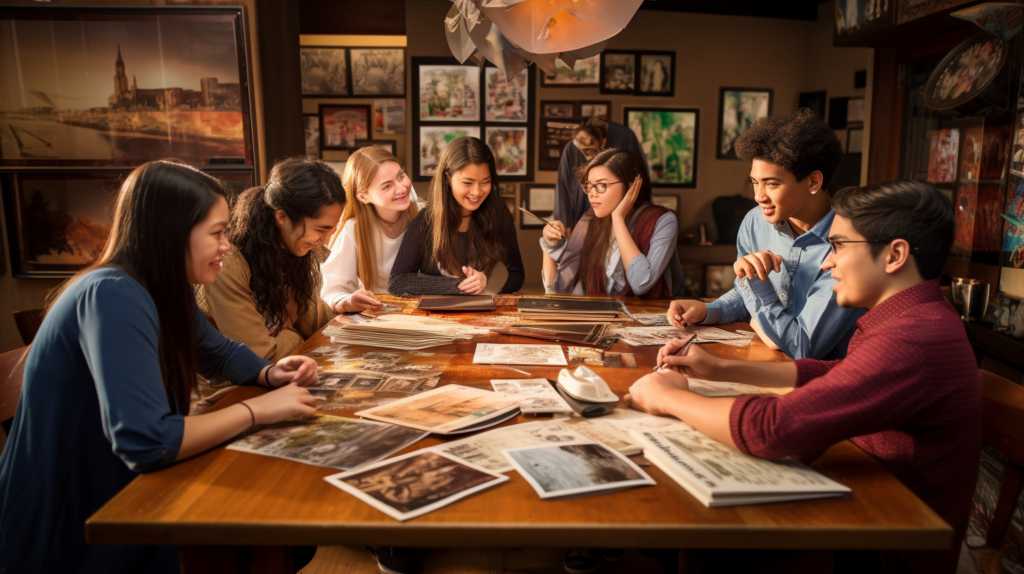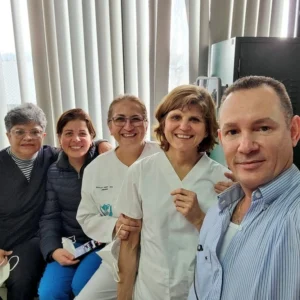Hey there! Have you ever considered the power of cultural exchange and volunteering? It’s a fantastic opportunity for students to broaden their horizons, step outside their comfort zones, and make a positive impact in the world. In this article, we will delve into the world of cultural exchange through volunteering, exploring why it’s important, the benefits it brings, and how you can get involved.
Whether you’re a student looking for a unique and meaningful experience or someone interested in learning more about the power of cultural exchange, this article is for you. So, let’s dive in and explore the incredible possibilities that await us through volunteering and cultural exchange.
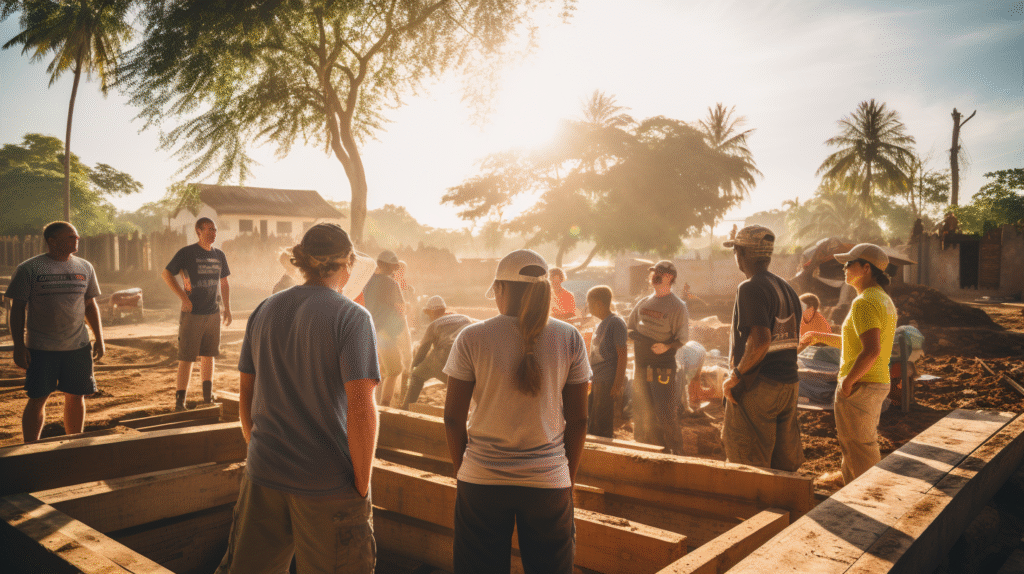
Understanding Cultural Exchange
Cultural exchange is a powerful phenomenon that allows individuals to immerse themselves in different cultures and learn from the experiences of others. It goes beyond mere travel and sightseeing and involves actively engaging with local communities, understanding their customs and traditions, and exchanging ideas and knowledge. Cultural exchange plays a crucial role in shaping global citizens, fostering mutual understanding, and promoting harmony in our diverse world.
Defining Cultural Exchange
Cultural exchange can be defined as the mutual sharing of values, beliefs, traditions, and customs between individuals or groups from different cultural backgrounds. It involves the exchange of ideas, knowledge, and experiences, leading to a deeper understanding and appreciation of diverse cultures. Cultural exchange can take various forms, including:
- Language exchange: The exchange of languages allows individuals to explore different cultures through communication and language learning.
- Artistic exchange: Sharing and experiencing different forms of art, such as music, dance, and visual arts, helps individuals gain insights into the cultural expressions of different communities.
- Educational exchange: Students and educators can participate in exchange programs to learn about different education systems, teaching methods, and academic practices.
- Homestays: Living with a local family in a foreign country provides an immersive experience, exposing individuals to daily life, customs, and traditions of the host culture.
Importance of Cultural Exchange in Education
Cultural exchange is of great significance in education as it exposes students to a global perspective and enhances their learning in various ways. Here are some key reasons why cultural exchange is essential for students:
- Broadening perspectives: Cultural exchange helps students see the world from different angles, challenging their preconceived notions and expanding their horizons.
- Building cultural competence: By engaging with people from different backgrounds, students develop skills to navigate and appreciate diverse cultures, promoting inclusivity and empathy.
- Enhancing language skills: Language immersion through cultural exchange programs aids in improving language proficiency and cross-cultural communication skills.
- Promoting intercultural understanding: Students gain firsthand knowledge of different customs, traditions, and social attitudes, which helps them develop a deep respect for cultural diversity.
- Fostering personal growth: Cultural exchange encourages students to step out of their comfort zones, fostering resilience, independence, and adaptability.
In an increasingly interconnected world, cultural exchange prepares students to become global citizens who can navigate diverse environments and contribute positively to society. It is a valuable educational tool that goes beyond textbooks and classrooms, enabling students to gain practical insights into different cultures and become well-rounded individuals.
Benefits of Volunteering for Students
Volunteering is a wonderful way for students to step out of their comfort zones, explore new cultures, and make a positive impact in the world. It offers a unique opportunity for personal growth, skill development, and the chance to make a difference in the lives of others. Let’s take a closer look at some of the benefits that students can gain from volunteering:
Enhancing Global Perspective
By volunteering in different parts of the world, students have the chance to immerse themselves in new cultures and gain a deeper understanding of the global community. They can learn about the challenges and issues faced by people in different countries and develop a broader perspective on the world. This experience can help them become more open-minded, adaptable, and appreciative of diversity.
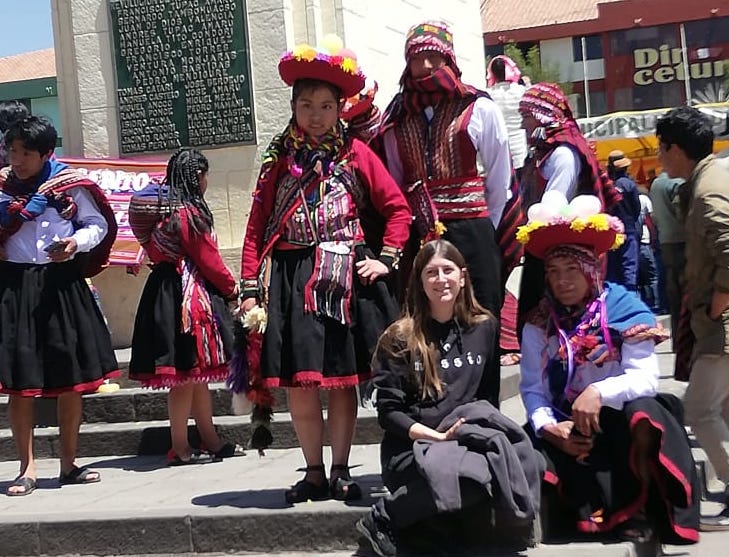
Developing Cultural Competence
Volunteering in a different cultural setting allows students to develop cultural competence, which is the ability to interact effectively with people from different backgrounds. They can learn to navigate cultural differences, adapt to new customs, and communicate across language barriers. This valuable skill is highly sought after by employers in today’s increasingly globalized world.
Building Empathy and Tolerance
Volunteering exposes students to individuals and communities facing various challenges, such as poverty, inequality, or environmental issues. Through these experiences, students can develop empathy and a greater sense of compassion. They learn to see the world through the eyes of others and develop a deeper appreciation for the struggles and triumphs of people from different walks of life. This builds their capacity for tolerance, understanding, and social responsibility.
In addition to these transformative personal benefits, volunteering can also have a positive impact on a student’s academic and professional journey. Universities and employers often recognize the value of volunteering experiences, and they look favorably upon students who have taken the initiative to give back to their communities. Volunteering can enhance a student’s resume, demonstrate their dedication to social issues, and provide practical skills that can be applied to future academic or professional pursuits.
So, whether it’s teaching English in a rural village, working on a conservation project in a national park, or supporting a community development initiative, volunteering can truly be a life-changing experience for students. It offers the opportunity to grow personally, gain valuable skills, and contribute to positive change in the world. If you are a student looking for a way to broaden your horizons and make a difference, volunteering may be the perfect path for you.
“The best way to find yourself is to lose yourself in the service of others.” – Mahatma Gandhi
Finding Volunteering Opportunities
Finding volunteering opportunities can be an exciting and rewarding experience. Whether you are a student looking to broaden your horizons or an individual seeking to give back to the community, there are numerous options available to suit your interests and goals. Here are some tips to help you find the perfect volunteering opportunity:
Researching Volunteer Programs
- Conduct thorough research online and explore different organizations and programs that align with your interests and values. Websites such as VolunteerMatch, Idealist, and GoAbroad offer comprehensive databases of volunteer opportunities both locally and globally.
- Read reviews and testimonials from past volunteers to gain insights into the program’s credibility and impact.
- Take into consideration factors such as location, duration, required skills, and cost (if applicable) when narrowing down your options.
Utilizing International Volunteer Organizations
- International volunteer organizations like United Nations Volunteers, World Wildlife Fund, and Projects Abroad specialize in connecting volunteers with diverse projects around the world.
- These organizations often have established partnerships with local communities, ensuring that your volunteering experience is well-structured and contributes to sustainable development.
- It is important to understand the organization’s mission, values, and the type of projects they offer to determine if it aligns with your goals and interests.
Exploring Local and Community-Based Opportunities
- Look for volunteering opportunities within your local community. Local schools, hospitals, animal shelters, and community centers often welcome volunteers.
- Connect with grassroots organizations or nonprofits in your area. These organizations might not have a strong online presence, so reaching out through local directories, community boards, or social media groups can be helpful.
- Consider volunteering for events, fundraisers, or campaigns organized by local nonprofits. These opportunities can provide a valuable learning experience while making a positive impact in your community.
Remember, volunteering should be a meaningful and enriching experience for both you and the community you serve. So take your time to find an opportunity that aligns with your interests, values, and goals.

Preparing for the Volunteer Experience
Preparing for a volunteer experience is essential to ensure a smooth and meaningful cultural exchange. It’s important to take the necessary steps to understand and familiarize yourself with the local culture, customs, and traditions. Here are some key considerations to keep in mind when preparing for a volunteer experience:
Cultural and Language Preparation
- Research the culture: Take the time to learn about the country’s history, traditions, and values. Understanding the cultural context will help you navigate interactions and communication more effectively.
- Learn the language: While it may not be feasible to become fluent in a new language before your volunteer experience, learning a few basic phrases can go a long way in building rapport with the local community. Consider taking language classes or using language learning apps to get started.
- Connect with locals: Reach out to locals through social media platforms, language exchange groups, or forums to gain insights into the local culture and language. Connecting with locals can provide you with valuable advice and tips for your volunteer experience.
Understanding Local Customs and Traditions
- Respect local customs: Familiarize yourself with the social norms and customs of the community you’ll be volunteering in. Pay attention to dress codes, greetings, etiquette, and social taboos to ensure you don’t unintentionally offend anyone.
- Be adaptable: Prepare yourself mentally to adapt to new experiences and ways of life. Different cultures have their own unique ways of doing things, and being open-minded and flexible will make your volunteer experience more enriching.
- Be mindful of gestures and body language: Gestures and body language can vary across cultures, and what may be considered acceptable in your home country might be seen differently in the community you’ll be volunteering in. Educate yourself about cultural norms regarding gestures, personal space, and eye contact.
Health and Safety Considerations
- Get vaccinated: Depending on the destination, certain countries might require vaccinations or have specific health precautions. Consult with a healthcare professional specializing in travel medicine to determine the necessary vaccinations and medications for your volunteer experience.
- Obtain travel insurance: It’s always wise to have travel insurance that covers medical emergencies, trip cancellation, and lost belongings. Ensure that your insurance policy provides adequate coverage for the duration of your volunteer program.
- Research safety guidelines: Familiarize yourself with safety guidelines specific to the region you’ll be volunteering in. Stay informed about any travel advisories or safety concerns and take necessary precautions to ensure your well-being throughout your volunteer experience.
By taking the time to prepare for your volunteer experience, you’ll be better equipped to navigate cultural differences, communicate effectively, and make the most of the cultural exchange. Remember to approach your volunteer experience with an open mind and a willingness to learn, grow, and contribute to the community you’ll be serving.
Making the Most of Cultural Exchange
Cultural exchange is an incredibly valuable experience that can broaden your horizons, challenge your perspectives, and help you grow as an individual. When it comes to volunteering, cultural exchange becomes even more profound. It allows you to immerse yourself in a different culture, connect with local communities, and make a meaningful impact in the lives of others. If you’re considering volunteering abroad or within your own community, here are some tips to help you make the most of your cultural exchange experience:
Embracing New Experiences and Perspectives
One of the key elements of cultural exchange is being open to new experiences and perspectives. Embrace everything that comes your way – try new foods, participate in local traditions, and engage in activities that may be outside of your comfort zone. Remember that you are there to learn and grow, and stepping out of your familiar routines can lead to incredible personal development.
Building Relationships and Connections
Volunteering provides a unique opportunity to build relationships and connect with people from different backgrounds. Take the time to get to know the locals and your fellow volunteers. Listen to their stories, ask questions, and be genuinely interested in their lives. Building these connections can create lifelong friendships and allow you to gain a deeper understanding of the culture.

Engaging in Meaningful Interactions
Don’t be afraid to engage in meaningful interactions during your volunteering experience. This could involve participating in community projects, teaching and learning from local children, or collaborating with local organizations. By actively engaging in these interactions, you’ll not only make a positive impact but also gain a deeper appreciation for the community and culture you’re working with.
“Cultural exchange is a two-way street – it’s about sharing and learning from one another. The more you put yourself out there, the more enriching the experience will be.”
-Karen, a seasoned volunteer
So, don’t hesitate to step forward, lend a helping hand, and embrace the opportunities that come your way during your cultural exchange journey.
Remember, making the most of cultural exchange is a continuous process. It doesn’t end when your volunteering experience comes to a close. It’s essential to reflect on your experiences, apply what you’ve learned to your everyday life, and promote cultural exchange in your own community.
Post-Volunteering Reflection
Once you have completed your volunteering experience and returned home, it is important to take some time for post-volunteering reflection. This is a valuable opportunity to reflect on your cultural insights, apply your learnings to everyday life, and promote cultural exchange in your community. Here are a few ways you can make the most of your post-volunteering reflection:
Reflecting on Cultural Insights
Take some time to reflect on the cultural insights you gained during your volunteer experience. Think about the new perspectives you gained, the challenges you faced, and the lessons you learned. Consider the following questions:
- What aspects of the local culture did you find most interesting or different from your own?
- How did your volunteer work contribute to your understanding of the local community?
- What cultural practices or customs did you find particularly meaningful or impactful?
Reflecting on these questions will help you solidify and internalize your experience, and allow you to gain a deeper understanding of the culture you were immersed in.
Applying Learning to Everyday Life
The knowledge and skills you acquired during your volunteer experience can be applied to your everyday life, even after you have returned home. Consider how you can integrate your learnings into your personal and professional life. Here are a few ideas:
- Share your experience with friends, family, and colleagues: Use your stories and insights to educate others about the culture and community you volunteered in.
- Incorporate cultural practices into your daily routine: If you learned about unique customs or traditions, consider incorporating elements of those practices into your own life as a way to honor and celebrate the culture.
- Use your new perspective to approach challenges: The cross-cultural experiences you had during your volunteer work can provide you with a fresh perspective when facing challenges or problem-solving. Embrace this diversity of thought and approach tasks with an open mind.
Promoting Cultural Exchange in the Community
As a volunteer, you have the power to promote cultural exchange in your own community. Here are a few ways you can continue to foster cultural understanding and dialogue:
- Organize events or presentations: Share your experience and insights with others by organizing events or giving presentations about your volunteering journey. This can help raise awareness about the culture and community you worked with.
- Volunteer locally: Look for opportunities to volunteer locally that promote cross-cultural understanding. This could include working with immigrant communities, participating in cultural festivals, or joining organizations that support diversity and inclusivity.
- Advocate for cultural exchange programs: Speak up and advocate for cultural exchange programs in schools, universities, and community organizations. These programs provide opportunities for individuals to engage in cross-cultural experiences, fostering understanding and empathy.
By actively promoting cultural exchange in your community, you can help create a more inclusive and interconnected world.
With post-volunteering reflection, you can solidify the cultural insights you gained, apply your learnings to everyday life, and promote cultural exchange in your community. Embrace the power of your volunteering experience and continue to cultivate a global perspective that celebrates diversity and fosters understanding.
Conclusion
In conclusion, volunteering for students offers a powerful opportunity to engage in cultural exchange and gain invaluable personal growth. By understanding and appreciating different cultures, students can broaden their perspectives, develop empathy and tolerance, and enhance their global competency. Through volunteering, students can actively contribute to communities in need while immersing themselves in a rich and diverse cultural experience.
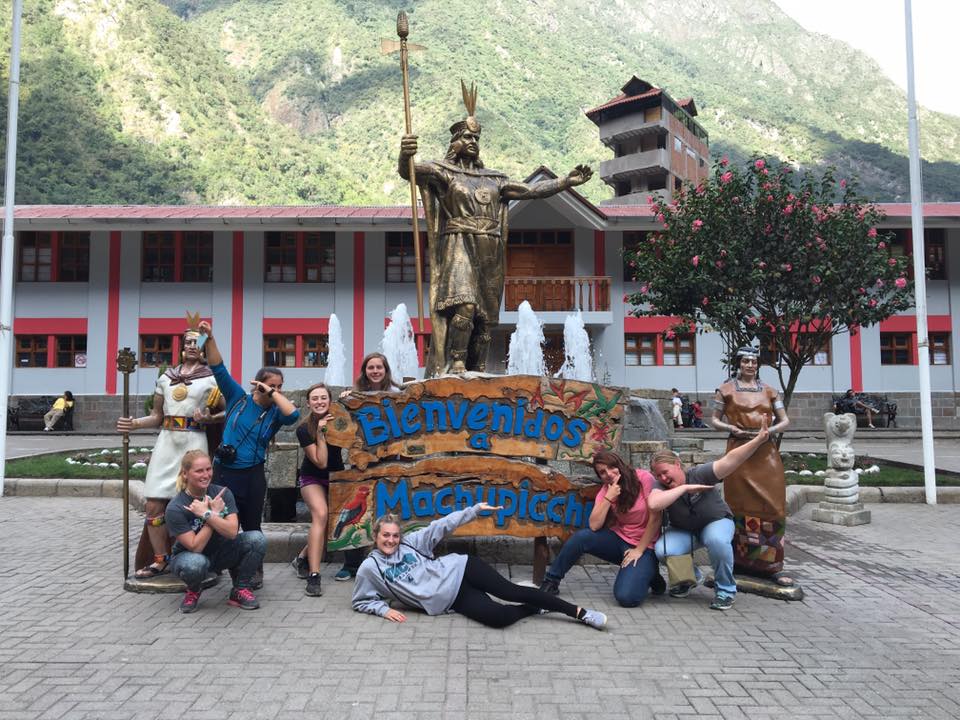
Cultural exchange is not only beneficial for individual students, but also contributes to creating a more connected and inclusive society. By embracing new experiences and perspectives, building relationships and connections, and engaging in meaningful interactions, students can make the most of their volunteering experience and become true ambassadors of cultural exchange.
After the volunteer experience, it is important for students to reflect on the cultural insights gained and apply their learnings to their everyday lives. By promoting cultural exchange in their communities and sharing their experiences, students can inspire others to embrace diversity and foster a more inclusive society.
H is a transformative experience that goes beyond traditional learning methods. It allows students to step out of their comfort zones, challenge their assumptions, and develop life skills that will benefit them personally and professionally. By actively seeking out h researching programs, and preparing themselves for the experience, students can embark on a journey of growth and self-discovery.
So, whether you are a student looking to make a difference in the world or an educator seeking to enhance your students’ learning experience, volunteering for cultural exchange is a rewarding and impactful pathway to explore.
Remember, the power of cultural exchange lies in our willingness to embrace diversity, foster empathy, and build connections. Let’s make a difference, one volunteering experience at a time!
Frequently Asked Questions
- What is cultural exchange through volunteering for students?Cultural exchange through volunteering for students refers to the practice of students engaging in volunteer work in foreign countries to immerse themselves in different cultures, learn about local customs, and contribute to community development.
- Why is cultural exchange important for students?Cultural exchange is important for students as it promotes tolerance, understanding, and appreciation for different cultures. It broadens their perspectives, enhances intercultural communication skills, and fosters personal growth and empathy.
- What types of volunteer work can students engage in during cultural exchange?Students can engage in various volunteer work during cultural exchange, such as teaching English, assisting in community development projects, participating in environmental conservation efforts, supporting healthcare initiatives, and working with underprivileged communities.
- How can students find cultural exchange volunteering opportunities?Students can find cultural exchange volunteering opportunities through reputable organizations, educational institutions, or online platforms specialized in connecting volunteers with projects worldwide. Researching and contacting local NGOs in the desired destination can also yield volunteering options.
- What are the benefits of volunteering abroad for students?Volunteering abroad offers numerous benefits for students, including gaining cross-cultural competencies, enhancing language skills, building a global network, developing leadership and teamwork abilities, and boosting their resumes and college applications.

